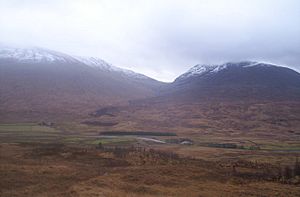Battle of Black Mount facts for kids
Quick facts for kids Battle of Black Mount |
|||||||
|---|---|---|---|---|---|---|---|
| Part of the Scottish clan wars | |||||||
 The Black Mount area |
|||||||
|
|||||||
| Belligerents | |||||||
| Clan Stewart of Appin Clan MacLaren |
Clan MacDonald of Keppoch | ||||||
| Commanders and leaders | |||||||
| Dugald Stewart of Appin (KIA) | MacDonald of Keppoch (KIA) | ||||||
| Casualties and losses | |||||||
| Dugald Stewart of Appin killed, and "many slain" | MacDonald of Keppoch killed, and "many slain" | ||||||
The Battle of Black Mount was a fight between different Scottish clans. It happened around 1497 or 1498 in a place called Black Mount. This area is in the Scottish Highlands, between Glen Orchy and Glen Coe. The battle was fought between the Clan Stewart of Appin and their friends, the Clan MacLaren, against the Clan MacDonald of Keppoch.
Why the Battle Started
The Clan MacLaren had gone into an area called the Braes of Lochaber. They took some cattle that belonged to the Clan MacDonald of Keppoch. The MacDonalds quickly followed them to get their cattle back. They caught up with the MacLarens in Glen Orchy. After a quick fight, the MacDonalds got their cattle back.
But the MacLarens didn't give up. They asked their allies, the Clan Stewart of Appin, for help. The leader of the Stewarts was a man named Dugald Stewart.
The Battle of Black Mount
Dugald Stewart quickly gathered his men and joined the MacLarens. Then, the two sides met and fought at Black Mount. This spot was near the top of Glen Coe.
It was a tough fight for both sides. Dugald Stewart, the chief of the Appin Stewarts, was killed. The chief of the MacDonalds of Keppoch was also killed during the battle. Many other fighters from both clans also lost their lives.
What Happened Next
After Dugald Stewart of Appin died, his oldest son, Duncan, became the new chief. Duncan never got married. So, when he passed away, Dugald's second son, Alan, became the chief. Alan later fought in another famous battle called the Battle of Flodden in 1513, and he survived.
See also
 | Janet Taylor Pickett |
 | Synthia Saint James |
 | Howardena Pindell |
 | Faith Ringgold |

